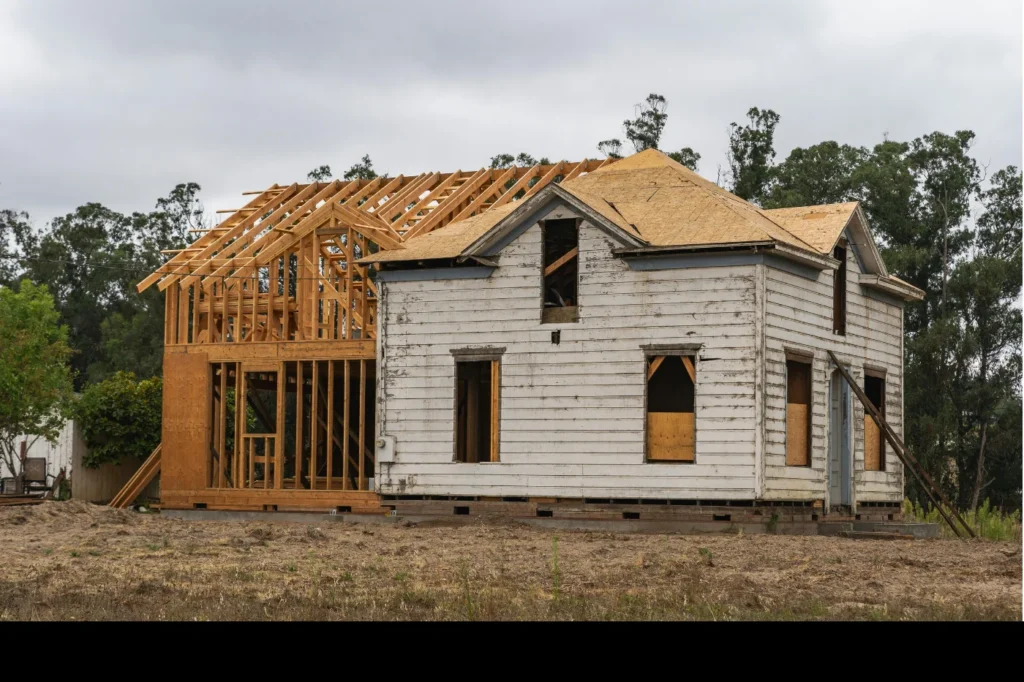Building or remodeling a home is a major investment that requires not only money but also trust in the people you hire. Your project may be worth hundreds of thousands or millions of dollars, and its realization may engage hundreds of people. Thus, when planing a home renovation or building a new one, you should choose a contractor wisely. In this article, we will share our knowledge and observations, that we have been collecting for more than 15 years. Read it twice before you sign any agreement!
Table of Contents
Who Is a General Contractor and What Do They Do?

A general contractor is a company (sometimes a person) that oversees the entire construction process – from the very first day on site to the final inspection. They coordinate the work of all subcontractors and employees, manage material orders and scheduling, and make sure every stage of the project follows the approved plans and complies with all building codes. In some sense, the core business of every general contractor is simply a project management, but usually, these companies conduct also some jobs that include in a project as whole.
A skilled general contractor also takes responsibility for job-site safety and communication with local stakeholders. They ensure that all work meets local regulations and safety standards established by OSHA (the Occupational Safety and Health Administration). Many general contractors collaborate with trusted specialists in other trades, such as roofing companies, to guarantee the highest quality and long-term durability of the entire structure.
A good contractor supervises every stage of the investment – from the foundations, through installations, to the roof and finishing works. Some GCs, such as Integrity Construction Consulting, are so-called design-build firms, which means that they can conduct the whole process of erecting the house, beginning with designing the building.
What Qualities Should a Good General Contractor Have?
A reliable general contractor should not only have years of experience but also know how to manage people, time, and resources efficiently. It sounds like a trivia, but the management skills of a general contractor affect the final project’s cost. Mistakes happen everywhere, but highly recommended GC will commit them less frequently and be able to deal with the consequences quicker.
Licensing

Every contractor must hold the proper state licenses and registrations that confirm their qualifications and legal right to operate. In Illinois, these can be easily verified through the public database of the Illinois Department of Financial and Professional Regulation (IDFPR), which provides up-to-date information on licensed contractors statewide. Probably every state in the United States has a similar record.
Choosing unlicensed contractor is definitely a bad idea – when the accident happens, your insurer may decline your claim.
Insurance

Every licensed general contractor is legally obliged to have a General liability insurance (GL) with a sum of $1,000,000 / $2,000,000 and the workers’ compensation. However, as a customer, you can demand the company serving your project to buy another policy – so-called umbrella insurance. Such a policy works like back-up, increasing the sum insured and increasing the payout chance.
Why insurance matters? General Contractor, just as any other company can go bankrupt. A load bearing wall may collapse, destroying your neighbors patio. During the construction process, the soil on the neighboring plot may get polluted with chemicals. Accidents happen, and their financial consequences may be severe.
While insurance premiums obviously rise the total cost of the construction, it’s a small percentage of the whole contract. It’s not worth to cut the corners on safety, so always demand a proof of insurance.
Portfolio
There’s nothing wrong with hiring an unexperienced general contractor for a small job, such as simple remodeling project – everyone needs to learn somewhere. However, when planning a new construction or a major remodeling, experience matters like nothing else. Proven subcontractors, all equipment needed, relationships with architects and material vendors are a real business advantage, that affects the pace of work, reducing the quantity and scales of failures.
Don’t hesitate to ask for a portfolio, references or examples of work in your area. It’s also worth doing some research at the Internet – websites such as Better Business Bureau (BBB), Yelp, Houzz or Google Maps are a great source of reviews and information about the company that gave you a quote for a home remodel.
A professional contractor is someone who maintains open communication, responds promptly to questions, and keeps clients informed about every stage of the project. The same principles apply when choosing other types of building professionals – for instance, when selecting the right roofing company, where experience, communication, and trust matter just as much as price. Ensure yourself that your GC will point out a project manager to supervise the project. Without such a person, everything will be much more difficult to organize.
Where to Find a Reliable Contractor?
The best place to start your search is locally. Ask friends, family, or neighbors for recommendations, and always check online reviews, especially through the Better Business Bureau (BBB) or Google.
Contractors who have worked in the same area for years usually understand local regulations (which may be specific for your village or city), characteristics of local architecture and know where to buy all the materials needed. No matter what you hear, don’t believe that knowing local siding subcontractor or roofing materials distributor is not important. It is, because we can guarantee that during the home building process you will face the problems, and it’s much easier to solve them, if you know local specialists of all trades.
There’s nothing wrong with searching for potential contractors online. Keep in mind, however, that the position in search results in Google doesn’t mean anything – great as well as horrible contractors promote themselves in the same way!
How to Compare Offers from Different Contractors?

As a Glenview general contractor we probably shouldn’t say that, but you should always get at least few detailed quotes from several different companies. Many contractors tend to underestimate and then revise the contracts multiple times, what usually ends with a final payment exceeding the customer’s budget significantly. For this reason, you should always ask for details.
Once you’ve gathered several bids, take the time to make an informed and thoughtful choice. Don’t automatically go with the lowest price – cost alone should never be the deciding factor. What really matters is the scope of work, materials, warranties, and the contractor’s overall credibility. As we have mentioned before, some companies underestimate the price, just to win with the lowest initial cost.
A detailed written estimate is essential. It should clearly outline labor costs, materials, transportation, and any required building permits. Lack of transparency in pricing is often a red flag. Understanding what to look for when choosing a contractor helps you carefully review each item on the estimate and avoid hidden costs or future misunderstandings.
It’s also important to watch out for major price discrepancies. If one bid is significantly lower than the others, the contractor may be planning to cut corners on materials or labor. Seasoned professionals warn that such situations often lead to project delays, poor workmanship, and disputes – classic signs of an unreliable contractor.
Contract with the Contractor – What to Pay Attention To?

When signing a contract with your contractor, it’s important to pay close attention to every detail. The agreement should clearly outline the full scope of work, the project timeline, payment schedule, warranty conditions, the way the punch list is conducted. Every section should be written in plain, understandable language – there’s no room for vague wording or assumptions when it comes to a legal document, especially if it’s a home renovation project.
Make sure the contract also specifies who is responsible for potential damages, delays, or construction errors. Experienced professionals know that a well-written contract protects both sides and helps prevent disputes. Don’t be afraid to say that some parts of the agreement don’t suit you – as a clients, you are entitled to protect your rights.
Don’t overlook the topic of maintenance and post-project service. The contractor should clearly state who will handle minor repairs or inspections after completion. It’s especially important to clarify this in advance for elements like gutters and drainage systems, which require regular upkeep and may still fall under warranty.
A detailed, transparent contract isn’t just a formality – it’s your best protection. It ensures that the entire project runs smoothly, on time, and without unnecessary conflicts. Do we need to add that it’s worth consulting the contract with lawyer before you sign it?
The Most Common Mistakes Homeowners Make
One of the most common mistakes homeowners make when hiring a general contractor is focusing solely on price. A low bid may look appealing at first, but it often means cheaper materials, less experience, or inadequate supervision. What seems like a bargain in the beginning can easily turn into costly repairs and frustrating delays down the road.
Another major mistake is ignoring technical details during the planning stage. Many homeowners focus on design and appearance rather than quality and durability. Poorly chosen materials, finishes, or installation methods can significantly shorten the lifespan of exterior elements. It’s worth learning about common exterior design mistakes, which show how much the contractor’s experience matters in selecting the right solutions.
A frequent misstep is hiring a company without proper verification. Many homeowners fail to check licenses, references, or past projects, which often leads to disappointment. The same rules apply when selecting any construction professional – whether it’s a general contractor or a specialist in a specific field. That’s why it’s helpful to know what to look for when choosing a roofing contractor.
Every stage of a construction project requires thoughtful decisions. A good contractor is more than just a builder – they’re a partner who can guide you toward the right solutions and help you avoid unnecessary expenses.
Conclusion
Choosing the right general contractor is a decision that affects every stage of the construction process. They coordinate the work, ensure quality, and make sure the entire project runs smoothly and without unnecessary stress. That’s why it’s worth prioritizing experience and reliability over the lowest bid.
A good contractor thinks long-term — selecting materials and solutions that stand the test of time. They pay attention to detail, maintain open communication, and keep safety a top priority, giving homeowners confidence that every phase of the project will stay on track.
A well-considered choice of contractor is an investment in peace of mind, safety, and the assurance that your home will be built to the highest standards of quality.
Frequently Asked Questions (FAQ)
How many bids should I compare before choosing a contractor?
It’s best to collect at least three bids. This helps you understand the average project cost and spot any estimates that differ significantly from the others — often a sign that something may be off with the scope of work or the quality of materials.
What should a good contract with a general contractor include?
The contract should clearly define the scope of work, project timeline, payment terms, warranty conditions, and the responsibilities of both parties. Every detail — from materials to deadlines — should be written clearly and without vague language.
How can I avoid problems with an unreliable contractor?
Always check references, reviews, and previous projects. Never pay the full amount upfront, and avoid working with companies that don’t hold a valid license or refuse to sign a detailed written agreement.
Does homeowners insurance cover contractor mistakes?
Not always. Standard policies rarely cover damages caused by construction errors, which is why it’s essential for your contractor to carry valid liability insurance.
What should I do if the contractor fails to fulfill the contract?
If direct communication doesn’t resolve the issue, start by reporting it to the Better Business Bureau (BBB), which helps mediate disputes between customers and businesses. For more serious cases, you can also file an official complaint with the Illinois Attorney General’s Office.

